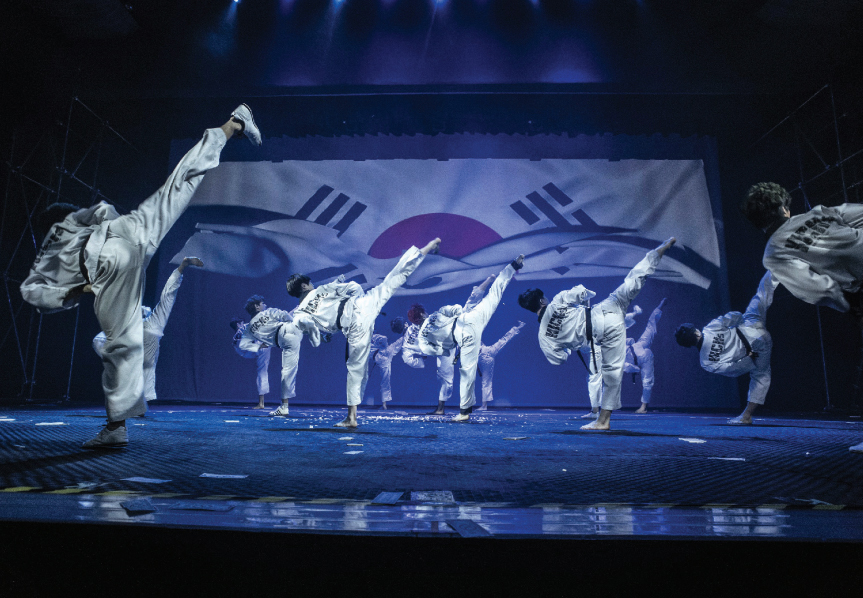Sulla Corea del Sud
Many Korean athletes have taken the world by storm, as exemplified by Kim Yuna, Son Heung-min, Kim Yeon-koung, and Ko Jin-young. These globally beloved sports stars have made their home country proud at numerous international sports events.
The continued success of Korean athletes can be attributed to the passion and determination of the Korean people, the country’s systemic support for its athletes, and a loyal fan base rooting for them.

Koreans Passionate about Sports
Korea has a wider foundation for sports, as elite sports and sports for all are closely connected with each other.
Football is one of Korea’s most popular sports. The K League (Korea Professional Football League) runs from March to November each year, with fierce competition among 12 regional teams. It’s well worth seeing the enthusiastic cheering by the Red Devils, the official supporting group for the Korea Republic national football team. There are a number of Korean footballers who have succeeded on the global stage including Park Ji-sung, who played for Manchester United, and Tottenham Hotspur forward Son Heung-min.
Koreans also love playing soccer as sports for all. Many Korean soccer lovers gather together early in the morning of a holiday to enjoy the sport. The number of people who have joined grassroots football teams stands at around 600,000 nationwide, forming regional football clubs.
As a mountainous country, Korea has an ideal environment for mountain climbers and hikers. There are many mountains near large cities, enabling city dwellers to enjoy mountain climbing and hiking conveniently. The country also has many popular rock-climbing spots.
In recent years, the hilly trails of Jeju Island (Jeju Olle Trail) have emerged as favorite destinations for hikers. Amid the new hiking boom, local government have vied with each other in their efforts to establish good and picturesque trails. Bike riding has also become the focus of attention as an environmentally friendly sport, and the number of cycling clubs has increased accordingly. A vast network of bicycle paths has been established across the country, and many people now enjoy cycling along the country’s major rivers such as Hangang River, Nakdonggang River, Geumgang River, and Yeongsangang River on weekends.
The background to such revitalization of Korean sports for all lies not merely in the rapid economic growth, improved living conditions, and increasing amounts of leisure time. It also includes the dramatic change of people’s involvement from indirect spectators just watching sports to direct engagement in sports since the 1988 Summer Olympics held in Seoul.
In addition, as some suggested a need for the revitalization of sports for all as a basic prerequisite for the development of professional sports, sports for all have rapidly grown quantitatively. Accordingly, the Korean government regularly identifies the people’s demand for sporting activities and is promoting a variety of relevant policies to promote sports for all.
The continued success of Korean athletes can be attributed to the passion and determination of the Korean people, the country’s systemic support for its athletes, and a loyal fan base rooting for them.

Taekwondo athletes competing in the Poomsae division in the training facility of Jincheon National Training Center.
Koreans Passionate about Sports
Korea has a wider foundation for sports, as elite sports and sports for all are closely connected with each other.
Football is one of Korea’s most popular sports. The K League (Korea Professional Football League) runs from March to November each year, with fierce competition among 12 regional teams. It’s well worth seeing the enthusiastic cheering by the Red Devils, the official supporting group for the Korea Republic national football team. There are a number of Korean footballers who have succeeded on the global stage including Park Ji-sung, who played for Manchester United, and Tottenham Hotspur forward Son Heung-min.
Koreans also love playing soccer as sports for all. Many Korean soccer lovers gather together early in the morning of a holiday to enjoy the sport. The number of people who have joined grassroots football teams stands at around 600,000 nationwide, forming regional football clubs.
As a mountainous country, Korea has an ideal environment for mountain climbers and hikers. There are many mountains near large cities, enabling city dwellers to enjoy mountain climbing and hiking conveniently. The country also has many popular rock-climbing spots.
In recent years, the hilly trails of Jeju Island (Jeju Olle Trail) have emerged as favorite destinations for hikers. Amid the new hiking boom, local government have vied with each other in their efforts to establish good and picturesque trails. Bike riding has also become the focus of attention as an environmentally friendly sport, and the number of cycling clubs has increased accordingly. A vast network of bicycle paths has been established across the country, and many people now enjoy cycling along the country’s major rivers such as Hangang River, Nakdonggang River, Geumgang River, and Yeongsangang River on weekends.
The background to such revitalization of Korean sports for all lies not merely in the rapid economic growth, improved living conditions, and increasing amounts of leisure time. It also includes the dramatic change of people’s involvement from indirect spectators just watching sports to direct engagement in sports since the 1988 Summer Olympics held in Seoul.
In addition, as some suggested a need for the revitalization of sports for all as a basic prerequisite for the development of professional sports, sports for all have rapidly grown quantitatively. Accordingly, the Korean government regularly identifies the people’s demand for sporting activities and is promoting a variety of relevant policies to promote sports for all.
